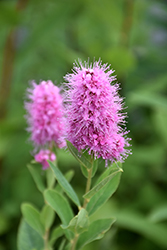It's all about ...
plants

Triumphans Spirea
Spiraea x billardii 'Triumphans'
Height: 5 feet
Spread: 4 feet
Sunlight:
![]()
Hardiness Zone: 3a
Description:
A large upright shrub topped with audacious plumes of violet-pink flowers throughout the summer, tends to sucker and form colonies, best used where this is an advantage; prune off flower heads after blooming to keep it looking neat
Ornamental Features
Triumphans Spirea features showy plumes of violet flowers rising above the foliage from early to mid summer. It has dark green deciduous foliage. The serrated pointy leaves do not develop any appreciable fall colour.
Landscape Attributes
Triumphans Spirea is a multi-stemmed deciduous shrub with an upright spreading habit of growth. Its average texture blends into the landscape, but can be balanced by one or two finer or coarser trees or shrubs for an effective composition.
This is a high maintenance shrub that will require regular care and upkeep, and is best pruned in late winter once the threat of extreme cold has passed. It is a good choice for attracting butterflies to your yard, but is not particularly attractive to deer who tend to leave it alone in favor of tastier treats. Gardeners should be aware of the following characteristic(s) that may warrant special consideration;
- Suckering
Triumphans Spirea is recommended for the following landscape applications;
- Mass Planting
- Hedges/Screening
- General Garden Use
- Naturalizing And Woodland Gardens
Planting & Growing
Triumphans Spirea will grow to be about 4 feet tall at maturity, with a spread of 4 feet. It tends to be a little leggy, with a typical clearance of 1 foot from the ground. It grows at a fast rate, and under ideal conditions can be expected to live for approximately 20 years.
This shrub should only be grown in full sunlight. It prefers to grow in average to moist conditions, and shouldn't be allowed to dry out. It is not particular as to soil type, but has a definite preference for acidic soils, and is subject to chlorosis (yellowing) of the foliage in alkaline soils. It is highly tolerant of urban pollution and will even thrive in inner city environments. This particular variety is an interspecific hybrid.
